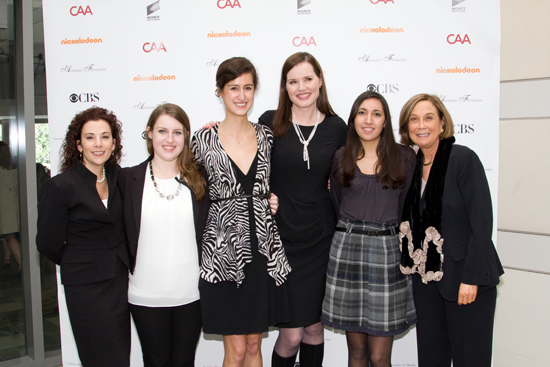COM Student Videos Shown to Hollywood Bigfeet
Part of alum Geena Davis’ effort to change media gender portrayals

Geena Davis’ realization that a problem exists in media portrayals of gender came about when she was doing what many parents of young children do: watching kids’ movies with her daughter. Oscar-winner Davis (CFA’79, Hon.’99) decided to do something about it. She created the Geena Davis Institute on Gender in Media six years ago to lobby for more female characters and fewer female stereotypes in children’s media.
A College of Communication student video will anchor a Hollywood campaign against gender stereotypes being launched by Davis and the institute, which commissioned the video, Guess Who, from Hothouse Productions, COM’s student-run video production outfit. The film explores children’s views of women in different roles. Excerpts from that video and another about its making premiered to positive reception from 600 Hollywood execs and artists at the institute’s second Symposium on Gender in Media, held at L.A.’s Skirball Cultural Center in December.
“We plan on promoting the video on our website and through social media,” says institute executive director Madeline Di Nonno (CAS’82). The institute would like to produce similar videos for a series as well, she says.
In the video, the filmmakers present children with the story of Joanne Chang, owner of Boston’s popular Flour Bakery, who parlayed her Harvard math degree into a career making mathematically perfect baked goods.
“From our interviews,” says associate producer Olivia Neir (COM’11), “we discovered that many children, when they think of a baker or a mathematician, think of those roles being filled by men. When we showed the children information about Joanne Chang, they were surprised. With the kids realizing that men and women can play any role, we then asked them what they wanted to be.” With answers like chemist, lawyer, architect, veterinarian, and artist, the children “showed that they felt no gender boundaries when choosing their own future.”
Three members of the student production team, Mariel Arroyo (COM’11), Sarah Kamaras (COM’11), and Elisabeth Norvik (COM’11), were able to attend the showing of the video excerpts in Los Angeles. “It was a lovely moment for the three students,” says Garland Waller (COM’80), a COM assistant professor of film and television and Hothouse’s academic executive producer.
“This was the biggest production and certainly the most well-known client” Hothouse has had, Waller says. Whereas past productions have consisted of four-person teams, these videos required two six-person teams, 30 children for on-camera interviews, and two cameras on each shoot (to capture the children and Chang while simultaneously recording shots of the BU teams at work.)
Among the Davis Institute’s initiatives was a study, released in October, of 122 recent family films in which females comprised just 29 percent of the speaking characters—and those female characters tended to be sexualized. A follow-up survey is scheduled for 2015.
Davis came to campus in November to speak about her activism as part of the Friends of the Libraries of Boston University Speaker Series.
Rich Barlow can be reached at barlowr@bu.edu.

Comments & Discussion
Boston University moderates comments to facilitate an informed, substantive, civil conversation. Abusive, profane, self-promotional, misleading, incoherent or off-topic comments will be rejected. Moderators are staffed during regular business hours (EST) and can only accept comments written in English. Statistics or facts must include a citation or a link to the citation.